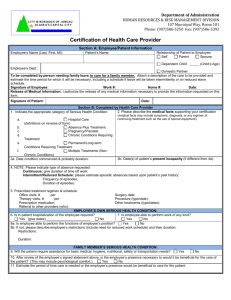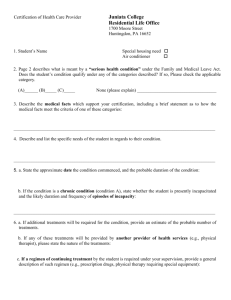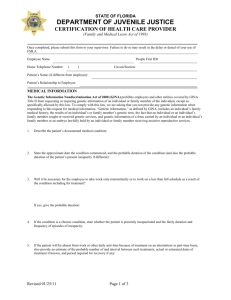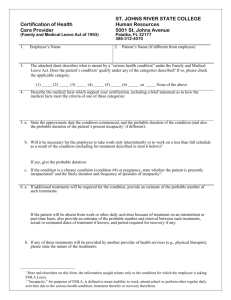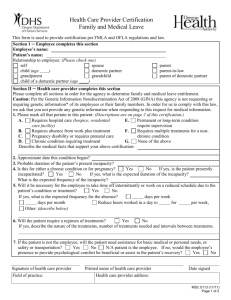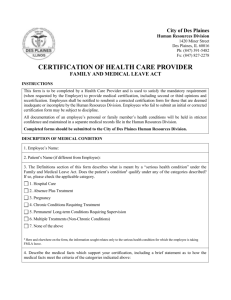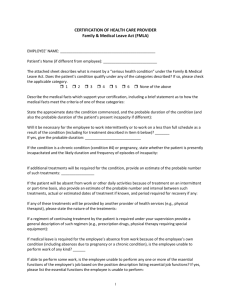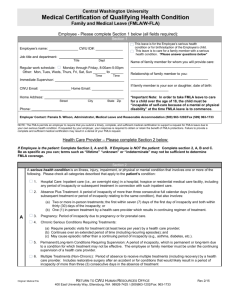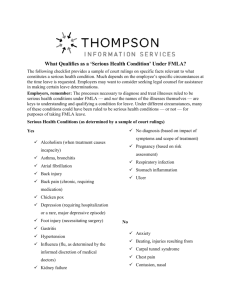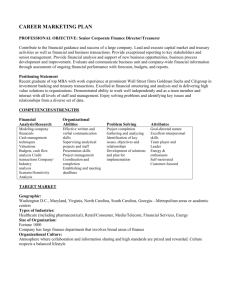Health Care Provider Certification Form ()
advertisement
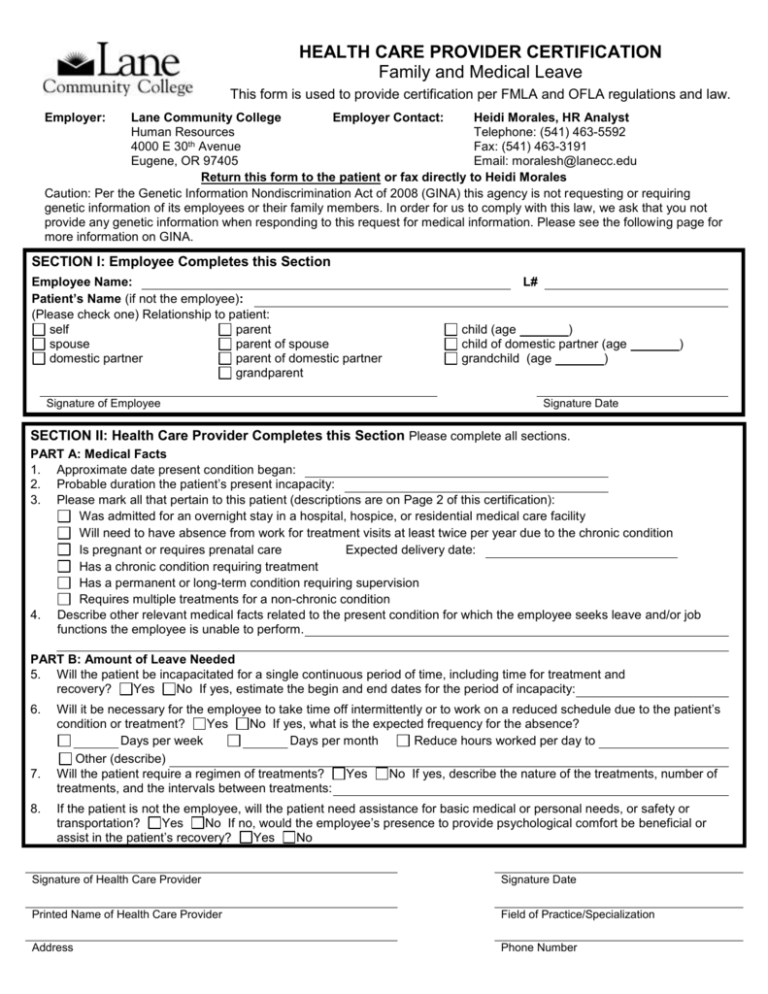
HEALTH CARE PROVIDER CERTIFICATION Family and Medical Leave This form is used to provide certification per FMLA and OFLA regulations and law. Employer: Lane Community College Employer Contact: Heidi Morales, HR Analyst Human Resources Telephone: (541) 463-5592 4000 E 30th Avenue Fax: (541) 463-3191 Eugene, OR 97405 Email: moralesh@lanecc.edu Return this form to the patient or fax directly to Heidi Morales Caution: Per the Genetic Information Nondiscrimination Act of 2008 (GINA) this agency is not requesting or requiring genetic information of its employees or their family members. In order for us to comply with this law, we ask that you not provide any genetic information when responding to this request for medical information. Please see the following page for more information on GINA. SECTION I: Employee Completes this Section Employee Name: Patient’s Name (if not the employee): (Please check one) Relationship to patient: self parent spouse parent of spouse domestic partner parent of domestic partner grandparent Signature of Employee L# child (age ) child of domestic partner (age grandchild (age ) ) Signature Date SECTION II: Health Care Provider Completes this Section Please complete all sections. PART A: Medical Facts 1. Approximate date present condition began: 2. Probable duration the patient’s present incapacity: 3. Please mark all that pertain to this patient (descriptions are on Page 2 of this certification): Was admitted for an overnight stay in a hospital, hospice, or residential medical care facility Will need to have absence from work for treatment visits at least twice per year due to the chronic condition Is pregnant or requires prenatal care Expected delivery date: Has a chronic condition requiring treatment Has a permanent or long-term condition requiring supervision Requires multiple treatments for a non-chronic condition 4. Describe other relevant medical facts related to the present condition for which the employee seeks leave and/or job functions the employee is unable to perform. PART B: Amount of Leave Needed 5. Will the patient be incapacitated for a single continuous period of time, including time for treatment and recovery? Yes No If yes, estimate the begin and end dates for the period of incapacity: 6. 7. 8. Will it be necessary for the employee to take time off intermittently or to work on a reduced schedule due to the patient’s condition or treatment? Yes No If yes, what is the expected frequency for the absence? Days per week Days per month Reduce hours worked per day to Other (describe) Will the patient require a regimen of treatments? Yes No If yes, describe the nature of the treatments, number of treatments, and the intervals between treatments: If the patient is not the employee, will the patient need assistance for basic medical or personal needs, or safety or transportation? Yes No If no, would the employee’s presence to provide psychological comfort be beneficial or assist in the patient’s recovery? Yes No Signature of Health Care Provider Signature Date Printed Name of Health Care Provider Field of Practice/Specialization Address Phone Number CERTIFICATION form (continued) Federal and Oregon Family and Medical Leave Acts Important Information Regarding GINA: The Genetic Information Nondiscrimination Act of 2008 (GINA) prohibits employers and other entities covered by GINA Title II from requesting or requiring genetic information of an individual or family member of the individual, except as specifically allowed by this law. To comply with this law, we are asking that you do not provide any genetic information when responding to this request for medical information. ‘Genetic information’, as defined by GINA, includes an individual’s family medical history, the results of an individual’s or family member’s genetic tests, the fact that an individual or an individual’s family member sought or received genetic services, and genetic information of a fetus carried by an individual, or an individual’s family member or an embryo lawfully held by an individual or family member receiving assistive reproductive services. Definition of a “Serious Health Condition” A “serious health condition” is defined as an illness, impairment, physical or mental condition that involves one of the following: 1) Hospital careInpatient care (i.e. overnight stay) in a hospital, hospice, or residential medical care facility, including any period of incapacity or subsequent treatment in connection with or consequent to such inpatient care. 2) Absence plus treatmentA period of incapacity of more than three consecutive calendar days (including any period of incapacity or subsequent treatment relating to the same condition), that also involves: a) Treatments two or more times by a licenses healthcare provider, nurse, or physician’s assistant under direct supervision of a healthcare provider, or by a provider of healthcare services (e.g. physical therapist) under orders of, or on referral by, a healthcare provider or b) Treatment by a healthcare provider on at least one occasion which results in a regimen of continuing treatment under supervision of the healthcare provider. 3) 4) 5) 6) 1) Treatment includes examinations to determine if a serious health condition exists and evaluations of the condition. Treatment DOES NOT include routine physical, dental or eye examinations. 2) A regimen of continuing treatment includes, for example, a course of prescription medication (e.g. an antibiotic) or therapy requiring special equipment to resolve or alleviate the health condition. A regimen of treatment DOES NOT include the taking of over-the-counter medications such as aspirin, antihistamines, or salves; or bed-rest, drinking fluids, exercise, or any other similar activities that can be initiated without a visit to a healthcare provider. PregnancyAny period of incapacity due to pregnancy, pregnancy-related illness, or for prenatal care. Chronic conditions requiring treatmentsA chronic serious health condition is one which: a) Required periodic visits for treatment by a healthcare provider, nurse, or physician’s assistant under direct supervision of a healthcare provider; b) Continues over an extended period of time (including recurring episodes of a single underlying condition; and c) May cause episodic rather than continuing periods of incapacity (e.g. asthma, diabetes, epilepsy, etc.) Permanent/long-term conditions requiring supervisionA period of incapacity that is permanent or long-term due to a condition for which treatment may not be effective. The employee or family member must be under the continuing supervision of, but need not be receiving active treatment by, a healthcare provider. Examples include Alzheimer’s, a severe stroke, or the terminal states of a disease. Multiple treatments (non-chronic conditions)Any period of absence to receive multiple treatments (including any period of recovery therefrom) by a healthcare provider or by a provider of healthcare services under orders of, or on referral by, a healthcare provider, either of restorative surgery after an accident or other injury, or for a condition that would likely result in a period of incapacity of more than three consecutive calendar days in the absence of medical intervention or treatment, such as cancer (chemotherapy, radiation, etc.) severe arthritis (physical therapy), or kidney disease (dialysis). Definition of “Incapacitated”: Inability to work, attend school, or perform other regular daily activities due to the serious health condition, treatment therefore, or recovery therefrom. Directions regarding “Regimen of treatment” (question 7): If the patient is under your supervision, provide a general description of such regimen, such as prescription drugs, physical therapy requiring special equipment. If the treatments will be provided by another provider of health services, such as physical therapist, please state the nature of the treatments.
